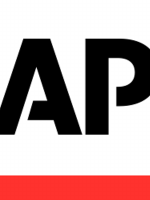Kansas Governor's Race is Referendum on Notorious Tax Cuts
By JOHN HANNA, AP Political Writer
TOPEKA, Kan. (AP) — A contentious Kansas governor's race has become a referendum on how a Republican experiment in slashing income taxes went awry, what lessons arose from the budget misery that followed and whether the state needs a do-over. Democratic nominee Laura Kelly, a veteran state senator, supported a successful effort last year to repeal most of the tax cuts and makes it a cornerstone of her campaign. She argues that Republican nominee Kris Kobach not only wants to repeat ex-GOP Gov. Sam Brownback's fiscal experiment but to top it. "We all know that Kansas has gone through a world of hurt," Kelly said during a debate Tuesday in Wichita at a Kansas Association of Broadcasters convention. "Do we hand the wheel to a man who has every intention of driving us back into the ditch?"
Kobach, the Kansas secretary of state and an ally of President Donald Trump, wants to return to cutting taxes but bristles at being described as another Brownback. He said in a recent interview that he would avoid mistakes that undermined Brownback's efforts — namely, not cutting state spending aggressively enough at the outset. "The failure, if there was one, was the failure to balance the budget. Spending did not come down," Kobach said during Tuesday's debate. "The insight is that you have to cut spending."
The race is a dead heat.
Independent candidate Greg Orman, a Kansas City businessman, trails well behind Kobach and Kelly but potentially could capture enough votes to keep Kelly from winning. On Tuesday, he ramped up attacks on Kelly as he sought to boost his standing.
The argument over taxes is likely to dominate the campaign's final weeks; it is playing out in television ads and was a persistent theme Tuesday. Tax cuts appeal to voters in a GOP-leaning state like Kansas, but the fiscal problems that followed Brownback's tax experiment made Kansas a memorable cautionary tale across the U.S. "It's incredibly notorious," said Meg Wiehe, deputy director of the liberal Institute on Taxation and Economic Policy. "Lots of people are still pointing to it as this is the way not to do things."
At Brownback's urging, the Republican-controlled Legislature cut personal income taxes in 2012 and 2013 to boost the economy, with Brownback promising that a "shot of adrenaline" would generate new revenues for schools and other budget needs. The state cut rates and exempted earnings for more than 330,000 farmers and business owners. But persistent budget shortfalls followed. Brownback and GOP legislators responded with a mix of increases in other taxes — boosting the sales tax in 2015 — along with budget patches and some spending cuts. State government's workforce already was declining but shrunk another 17 percent in the five years after the first tax cuts were passed.
Voters turned on Brownback in 2016, electing a less conservative Legislature. Bipartisan supermajorities overrode his veto in 2017 and imposed an income tax hike worth roughly $600 million a year.
Kelly is drawing strong support from teachers and other public education supporters who fear Kobach's promised push for income and sales tax cuts would erase increases in school funding won through Kansas Supreme Court decisions in an ongoing lawsuit.
Kelly promises to pursue proposals to decrease the state's 6.5 percent sales tax on groceries. But she emphasizes that the state first needs a stable budget and to see that funding for public schools continues to increase.
Kobach would cut the sales tax but sees cutting income taxes as a priority after last year's tax increase.
He is keen to pursue changes in the state's income tax code so that federal income tax cuts made at the end of 2017 don't continue to result in a windfall for the state. But otherwise, he has not been specific about how he'd cut sales and income tax rates.
Kobach said his plans would be tied to how much spending he can trim from the budget. He has made a much-disputed claim that the state can cut slash costs associated with providing services to immigrants living in the state illegally and can also trim spending by leaving vacant positions in the workforce open.
He also has been critical of the Supreme Court's decisions on school funding and legislation passed this year to phase in a $548 million increase over five years. Pressed on whether he would forgo future increases that have been promised, he acknowledged doing so would aid tax-cutting but added in a recent interview, "I haven't considered what we would do."
A drive to cut spending is likely to face skepticism from lawmakers. "Show me how that works," said Kansas House Majority Leader Don Hineman, a GOP moderate from western Kansas. "The history of the last six years tells me that it's very unlikely, but if it can be done, great."
But Kobach is echoing arguments of more conservative tax policy analysts nationally who say that income tax cuts — particularly in the state's top rate — can help its economy. They cite Indiana, North Carolina and Utah as states where tax cuts proved successful.
Joseph Bishop-Henchman, executive vice president of the conservative Tax Foundation, said states that pursue tax reform must couple it with a concrete plan to deal with budget issues. "You've got to have a cash flow analysis about how you're going to pay your bills," Bishop-Henchman said. He and other more conservative analysts also stress that reforms should make the tax code simpler and eliminate exemptions and deductions to offset rate cuts. While Brownback had such goals in pursuing his tax cuts, groups like the Tax Foundation and libertarian Cato Institute criticized the broad exemption for business owners as bad policy. "The idea that every state is Kansas is just ridiculous," said Ryan Bourne, a Cato economist. "What really matters were the details of the reform."



